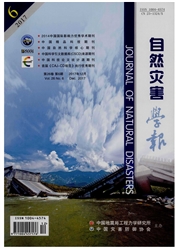

 中文摘要:
中文摘要:
以2007年云南宁洱6.4级地震灾区为例,通过现场访谈和问卷调查,分析了该地区农村家庭认知与响应地震灾害的特点及其家庭际的差异性。结果表明:当地农村家庭认知与响应地震灾害的水平尚不理想,综合防震减灾能力较弱;家庭对地震灾害知识和防震减灾技能的掌握程度,显著地影响着其在震时及震后的响应行为和态度,其中防震减灾技能的影响更显著;经济收入和教育背景不同的家庭,其地震灾害的认知水平和响应能力也呈现出明显的差异性,其中受教育程度的影响更明显,且可能是最根本的影响因素;家庭人口总数与家庭地震灾害认知与响应的综合能力呈显著的负相关关系,但这种影响也叠加了家庭经济文化因素的影响;对研究区而言,加强防震减灾实用技能和震时如何有效应对地震影响方面的教育,具有更重要的现实意义。
 英文摘要:
英文摘要:
Taking the disaster area of Ms 6.4 Ning' er, Yunnan earthquake in 2007 as the example, this paper analyzed the features of earthquake disaster awareness and response of rural households and their inter-household differences by field interview and questionnaire survey. The results showed that the capability of rural households to cognize on earthquake disasters and response to the earthquake event in the studied area is not ideal. The comprehensive capability of earthquake disaster prevention and disaster loss reduction is low. The knowledge of earthquake disasters and disaster-coping skills of rural families significantly influence their responses to actual earthquake e- vents, in which the effects of earthquake disaster-coping skills is more obvious. The features of earthquake disaster awareness and responses are obviously different if the families' economic and educational levels are different. The higher the education levels, or the better the economic situations of the families, the higher the capability of earth- quake disaster awareness and responses of families are. The effect of educational factor is more significant than the effect of economic factor and may be the basic influencing factor. The size of rural families is remarkably in nega- tive correlation with the comprehensive awareness and responses to earthquake disasters. However, this effect is strengthened by the economic and education factors. Therefore, a practical way to improve the capability of preven- ting earthquake disaster and reducing disaster loss of the families in the rural area is through promoting the development of social economic and educational levels and strengthening the publicity of the popular science knowledge on earthquake disasters, especially the education of practical skills.
 同期刊论文项目
同期刊论文项目
 同项目期刊论文
同项目期刊论文
 期刊信息
期刊信息
